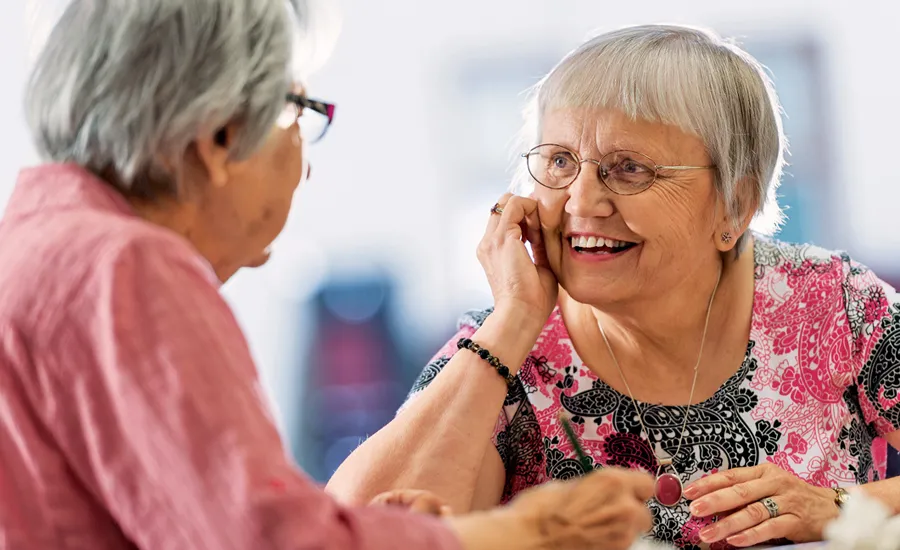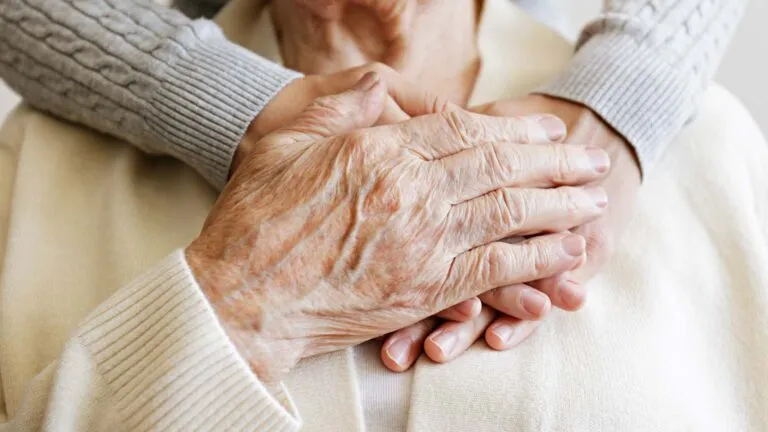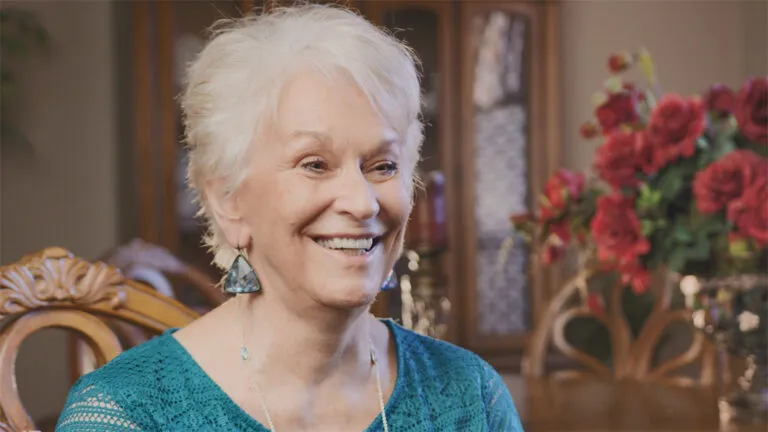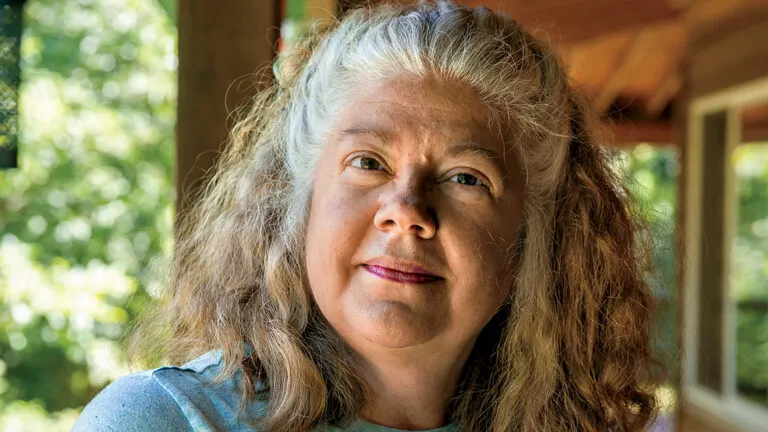Early mornings, I sit beside my living room window and say my prayers. The window faces southeast, toward the rising sun. I perch on a cushioned chest and watch the light gather over my small Wisconsin town. This is where I talk to God and feel the comfort of his presence.
One morning I sat on the chest, opened my Bible and read. It was one of my favorite verses, from Hebrews: “Never will I leave you; never will I forsake you.” The words passed in and out of my mind. I watched the sun rise but I didn’t feel God’s presence. I didn’t feel much of anything.
A few months earlier, my husband, Wayne, had died after battling a rare degenerative disease called multiple system atrophy. The gentle, quiet, clearheaded man I had loved for four decades had become so incapacitated that he couldn’t get out of bed without a mechanical lift.
ENJOYING THIS STORY? SUBSCRIBE TO GUIDEPOSTS MAGAZINE
I’d been Wayne’s caregiver for four years, as he declined from a vigorous hiker to someone who needed a cane, then a walker, then a wheelchair, and finally the lift. I’d taken over all the household tasks—paying bills and planning as well as cooking and cleaning.
On top of it all, I was diagnosed with breast cancer a year into Wayne’s decline. I juggled taking care of him with surgery, chemo and radiation treatments. By the time I was pronounced cancer-free, Wayne needed me around the clock.
And now he was gone. He’d died suddenly and unexpectedly in his sleep the day after his sixty-fifth birthday. It was a merciful end. Part of me knew I should be grateful. Grateful that Wayne had passed peacefully, and that our son Troy had helped so much at the end. I was free from worry and responsibility.
Yet as I sat there by the window and stared out at the gray spring dawn, I didn’t feel grateful. Or free. I didn’t feel any of the feelings I’d expected to feel when Wayne died.
I missed him terribly, yes—especially Wayne as he was before the illness, my steady companion, an excellent father to our boys. But I felt guilty too. Purposeless. Empty.
Every day for four years I’d gotten out of bed knowing exactly what I needed to do for the day. Now I had no clue. All I could think about was ways I’d been a less-than-perfect caregiver. And I wasn’t even a caregiver anymore! What was I supposed to do with myself?
READ MORE: AN ALZHEIMER’S CAREGIVER LEARNS A NEW WAY TO LOVE
God, I asked, are you hearing these questions?
The morning was silent.
I thought back to the day when Wayne was diagnosed, in 2006. He’d gone in for a routine checkup and the doctor noticed subtle imperfections in his gait and his speech that prompted further tests. A few months later, after an MRI and trips to a specialty clinic, we got the horrifying news.
Multiple system atrophy is like Parkinson’s disease on fast-forward. Life expectancy is less than a decade after diagnosis. The disease causes total deterioration of the body.
For four years I watched the man I loved—a strong factory worker, an outdoorsman, a leader in our church—vanish into himself, unable to move, then unable to speak clearly.
I knew nothing about caregiving except whatever I’d learned by being a mom. I’d been an elementary school teacher when Wayne and I married. I left my job when Derrick, our oldest, was born. Then came Troy and Brian. We moved to a house in the country outside Oostburg and raised the boys on two acres surrounded by farms and dairy cows.
I loved that house and I mourned when Wayne and I had to move to an apartment in town, then to the condo where I live now. I just couldn’t keep up with the house and the yard and Wayne’s care. Troy and his wife and kids moved into the house, so it stayed in the family, and we spent holidays there. But my expanse of trees and sky was gone. I made do with my morning perch at the window.
Every day I got Wayne up, helped him dress, prepared his food, got him into and out of the car for doctors’ appointments and helped him back into bed at night. I loved him and I never resented caring for him. But I was exhausted. And frazzled.
I had to learn so many new skills. Balancing the checkbook. Dealing with insurance companies. Sometimes Wayne seemed to deteriorate by the week. I feared every new loss.
Faith was my rock through all of it. I would have collapsed without it.
READ MORE: WHEN YOU’RE LOST, GOD FINDS YOU
Then why did I feel so alone now? So rudderless? It had been four months since Wayne died. I’d made it through the funeral. Sorted out his affairs. Shouldn’t some of the anxiety have lifted by now? I no longer had to face each day as a mountain.
Maybe that was part of the problem. Sometimes I awoke and began running through my mental checklist of things I needed to do for Wayne—only to remember that he was gone. Then a grayness settled over me. I thought of all the things I hadn’t done—told him I loved him enough, concealed my worries and exhaustion from him.
The unvarnished truth was I was a 63-year-old widow who’d lost her main reason for living. My primary accomplishment since Wayne’s death had been writing in my journal and starting a blog about the ups and downs of being a caregiver.
I needed a new direction.
But all I could think about as I stared out the window was caregiving. Was it possible I missed it? Surely not. I missed Wayne with a deep ache. But taking care of someone? I was supposed to feel liberated from that.
I got up and turned on my computer. “Volunteer opportunities, Sheboygan County,” I typed into the search engine. What was I even looking for? A long list of organizations appeared, everything from the Salvation Army to the historical museum. My eyes glazed. Then an entry caught my attention.
“The mission of the Gathering Place is sharing Christ’s love by providing a safe place for people with dementia and offering caregivers respite, education and encouragement.”
Offering caregivers respite. Wayne hadn’t suffered from dementia. But his disease had robbed him of speech and the ability to take care of himself. Boy, I could have used a place like this! For the first time in months I felt a stirring of interest. How fitting it would be to offer someone a respite from the kind of caregiving I’d done.
I called and the director invited me to drop by. The Gathering Place was run by a Lutheran congregation in nearby Sheboygan Falls. A few days later, I pulled up to a modern beige brick church building. I turned off the engine and sat there in the parking lot feeling apprehensive. Would I be able to handle the emotions I was about to experience?
Well, I was here. I should at least go in. I walked through the doors into what felt like a bustling community center. People of all ages—old folks, young volunteers, employees—were talking, listening to music and working on arts and crafts. It was lively and joyful.
I met the director and before I knew it I was sitting in a classroom, helping a woman with an art project. It was obvious that every activity at the Gathering Place was carefully designed to stimulate the minds of participants, helping them to retain memories and thinking skills.
I was glad to help. But I also experienced something more basic, something I’d been missing these past months. A connection with other people. A feeling of being useful, of being needed. I didn’t want to leave when the afternoon ended.
“Did you enjoy your day?” the director asked as I gathered my things.
I nodded.
“So we’ll see you next week?”
“Definitely,” I said.
I returned the following week—and just about every week thereafter. It has been four years since that first afternoon I spent at the Gathering Place. Since then, I’ve met so many wonderful people and have grown in confidence as a caregiver.
Just recently I was helping a woman named Marge with an art project. Marge repeated herself and had trouble remembering what she had done a few minutes earlier. But as we picked colors for her picture, she began telling a wonderful story about how much she’d loved the days when all the neighborhood children would come to her yard to play.
Her long-term memory was sharp and rich. Talking to me helped her to recognize that.
These days I still say my prayers each morning sitting on my chest by the window. I love watching the street come alive with people and color. I no longer feel purposeless or adrift. I know for a certainty what an immense gift the time I spent caring for Wayne had been.
Of course, I’ve long known that we’re called to give thanks for our hardships because they strengthen our faith. But this is deeper. I now understand that caregiving wasn’t just a stage in my life, a temporary hardship. It’s part of who I am. I have a heart for it.
Now God has given me an opportunity to use my experience to help others. I wasn’t liberated from caregiving when Wayne died. Caregivingwas the liberation. Serving others, I became more deeply myself, more the person God made me.
“Never will I leave you; never will I forsake you.” Those words from Hebrews are still some of my favorites in Scripture. I feel their truth every time I read them. I also feel the boundless love of the Caregiver who spoke them.
Learn more about the rewards of being a caregiver.
Did you enjoy this story? Subscribe to Guideposts magazine.





